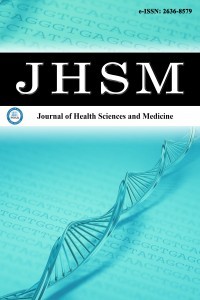Using the Charlson comorbidity index as a prognostic factor of lower gastrointestinal system bleeding: the experience of a tertiary center
___
- Kim BS, Li M, Engel BT, et al. Diagnosis of gastrointestinal bleeding: a practical guide for clinicians. World J Gastrointest Pathophysiol 2014; 5: 467-78
- Zuccaro G. Management of the adult patient with acute lower gastrointestinal bleeding. American College of Gastroenterology. Practice Parameters Committee. Am J Gastroenterol 1998; 93: 1202-08.
- Zuckerman GR, Prakash C. Acute lower intestinal bleeding. Part II: etiology, therapy, and outcomes. Gastrointest Endosc 1999; 49: 228-38.
- Strate LL. Lower GI bleeding: epidemiology and diagnosis. Gastroenterol Clin North Am 2005; 34: 643-64.
- Boley SJ, Sammartano R, Adams A, DiBiase A, Kleinhaus S, Sprayregen S. On the nature and etiology of vascular ectasias of the colon. Degenerative lesions of aging. Gastroenterology 1977; 72: 650-60.
- Boley SJ, DiBiase A, Brandt LJ, Sammartano RJ. Lower intestinal bleeding in the elderly. Am J Surg 1979; 137-57.
- Korkis AM, McDougall CJ. Rectal bleeding in patients less than 50 years of age. Dig Dis Sci 1995; 40: 1520-3.
- Moons KG, Altman DG, Reitsma JB, et al. Transparent Reporting of a multivariable prediction model for Individual Prognosis or Diagnosis (TRIPOD): explanation and elaboration. Ann Intern Med 2015; 162: W1-73.
- Charlson ME, Pompei P, Ales KL, MacKenzie CR. A new method of classifying prognostic comorbidity in longitudinal studies: development and validation. J Chronic Dis 1987; 40: 373-83.
- Gabriel SE, Crowson CS, O’Fallon WM. A comparison of two comorbidity instruments in arthritis. J Clin Epidemiol 1999; 52: 1137-42.
- Zhang JX, Iwashyna TJ, Christakis NA. The performance of different lookback periods and sources of information for Charlson comorbidity adjustment in Medicare claims. Med Care 1999; 37: 1128-39.
- Hussain H, Lapin S, Cappell MS. Clinical scoring systems for determining the prognosis of gastrointestinal bleeding. Gastroenterol Clin North Am 2000; 29: 445-64.
- Aoki T, Hirata Y, Yamada A, Koike K. Initial management for acute lower gastrointestinal bleeding. World J Gastroenterol 2019; 25: 69-84.
- Radaelli F, Frazzoni L, Repici A, et al. Clinical management and patient outcomes of acute lower gastrointestinal bleeding. A multicenter, prospective, cohort study. Digestive and Liver Disease 2021; 53: 1141-7.
- Strate LL, Orav EJ, Syngal S. Early predictors of severity in acute lower intestinal tract bleeding. Archives of Internal Medicine 2003; 838-43.
- Manning-Dimmitt LL, Dimmitt SG, Wilson GR. Diagnosis of gastrointestinal bleeding in adults. Am Fam Physician 2005; 71: 1339-46.
- Lhewa DY, Strate LL. Pros and cons of colonoscopy in management of acute lower gastrointestinal bleeding. World J Gastroenterol 2012; 18: 1185-90.
- Jensen DM, Machicado GA, Jutabha R, Kovacs TO. Urgent colonoscopy for the diagnosis and treatment of severe diverticular hemorrhage. N Engl J Med 2000; 342: 78-82.
- Gopalswamy N, Malhotra V, Reddy N, et al. Long-term mortality of patients admitted to the intensive care unit for gastrointestinal bleeding. South Med J 2004; 97: 955-8.
- Camus M, Jensen DM, Ohning GV, et al. Comparison of three risk scores to predict outcomes of severe lower gastrointestinal bleeding. J Clin Gastroenterol 2016; 50: 52-8.
- Yayın Aralığı: Yılda 6 Sayı
- Başlangıç: 2018
- Yayıncı: MediHealth Academy Yayıncılık
Çağrı TURAN, Nurcan METİN, Türkantuğba YILDIZ, Selcen CAFEROĞLU SKAT, Ahmet CİNİSLİOĞLU, Nazan CİNİSLİOĞLU
Caner DOĞAN, Meryem KEÇELİ BAŞARAN, Okan GÜRKAN, Seda GÜLEÇ GEYLANİ
Bılal GÜNAYDIN, Sarp Korcan KESKİN
Mustafa DÖNMEZ, Zuhal Özgün ERKESKİN, Tezcan AKIN, Erdinç ÇETİNKAYA, Özgür AKGÜL, Ali Emre AKGÜN, Hüseyin BERKEM, Bülent Cavit YÜKSEL, Sadettin ER
Tuğçe ŞAHİN ÖZDEMİREL, Berna AKINCI ÖZYÜREK, Kerem ENSARİOĞLU, Özlem ERTAN, Esma Sevil AKKURT
Nizamettin GÜZEL, Ahmet Serhat GENÇ, Lokman KEHRİBAR, Ali Kerim YILMAZ
Düriye Sıla KARAGÖZ ÖZEN, Abdulcelil KAYABAŞ, Mehmet Derya DEMİRAG
Bünyamin GÜNEY, Murat Yunus ÖZDEMİR, Emrah DOĞAN
Deniz İPEK, Murat ÇALBIYIK, Tuba DENİZCİ, Taner ALIÇ, Abdulrahim DÜNDAR, Sinan ZEHİR
